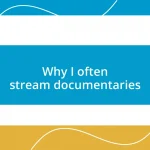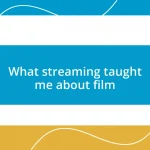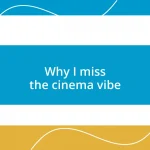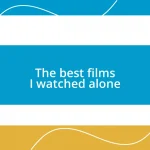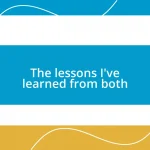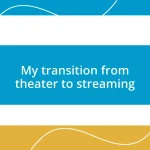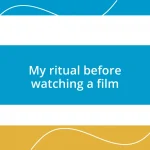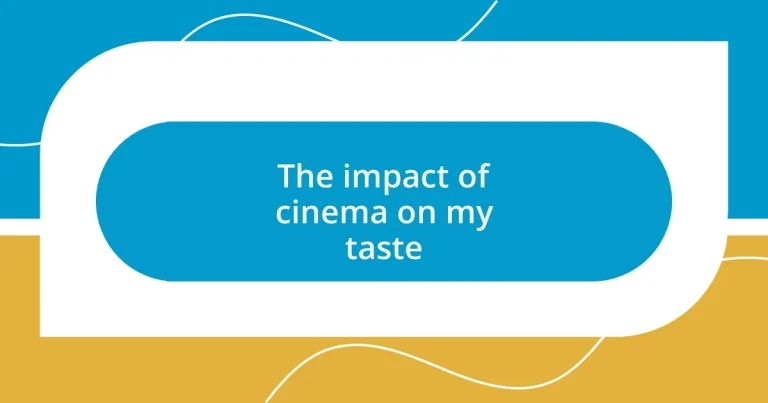Key takeaways:
- Personal cinematic tastes are shaped by childhood experiences and emotional connections with films, influencing preferences throughout life.
- Cultural context impacts film appreciation, leading to a greater understanding of societal themes and personal identity through diverse narratives.
- Social interactions and evolving interests can significantly alter one’s film preferences, fostering deeper connections and broader exploration of cinema over time.
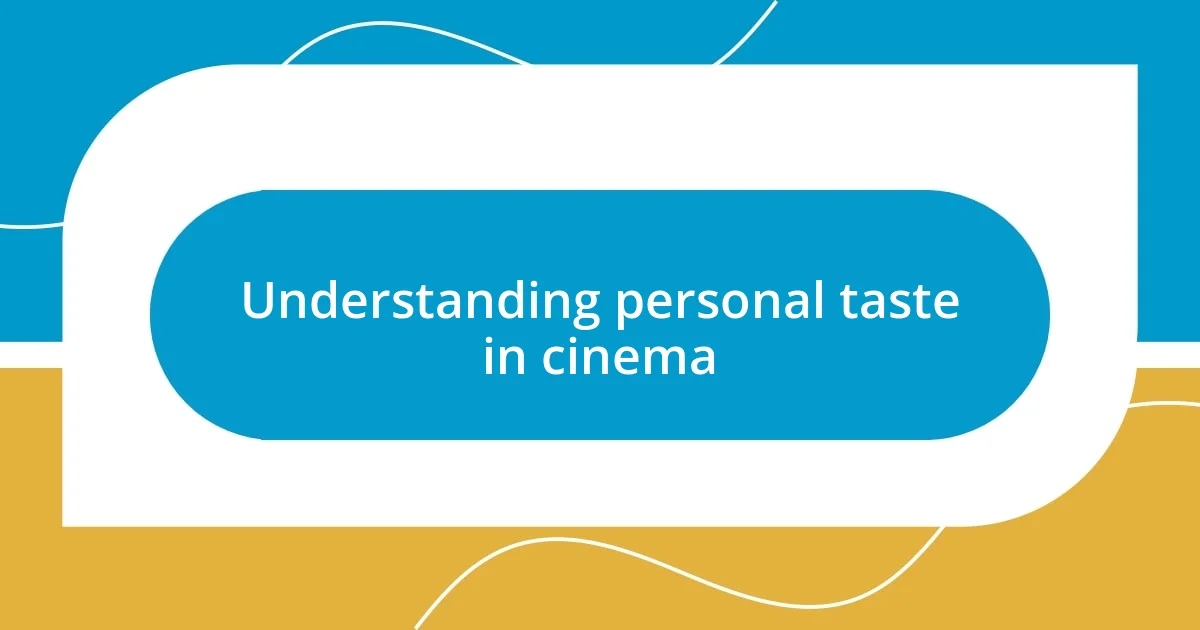
Understanding personal taste in cinema
Understanding personal taste in cinema is a deeply individual journey shaped by diverse factors. For instance, I often reflect on how my childhood experiences with film influenced my preferences. Watching classic Disney movies with my family ignited a sense of nostalgia that still draws me back to animated features today.
Have you ever noticed how certain films evoke specific emotions from you? I remember watching “Eternal Sunshine of the Spotless Mind” during a particularly reflective phase in my life. The film resonated with me on a profound level, blending romance with the harsh realities of memory and loss, which made me appreciate more complex storylines.
Our tastes often evolve as we grow, influenced by new experiences and perspectives. My appreciation for foreign films blossomed during a semester abroad; suddenly, I was captivated by stories and cinematography from different cultures. It’s intriguing how our cinematic preferences can mirror our personal growth and shifting viewpoints, don’t you think?
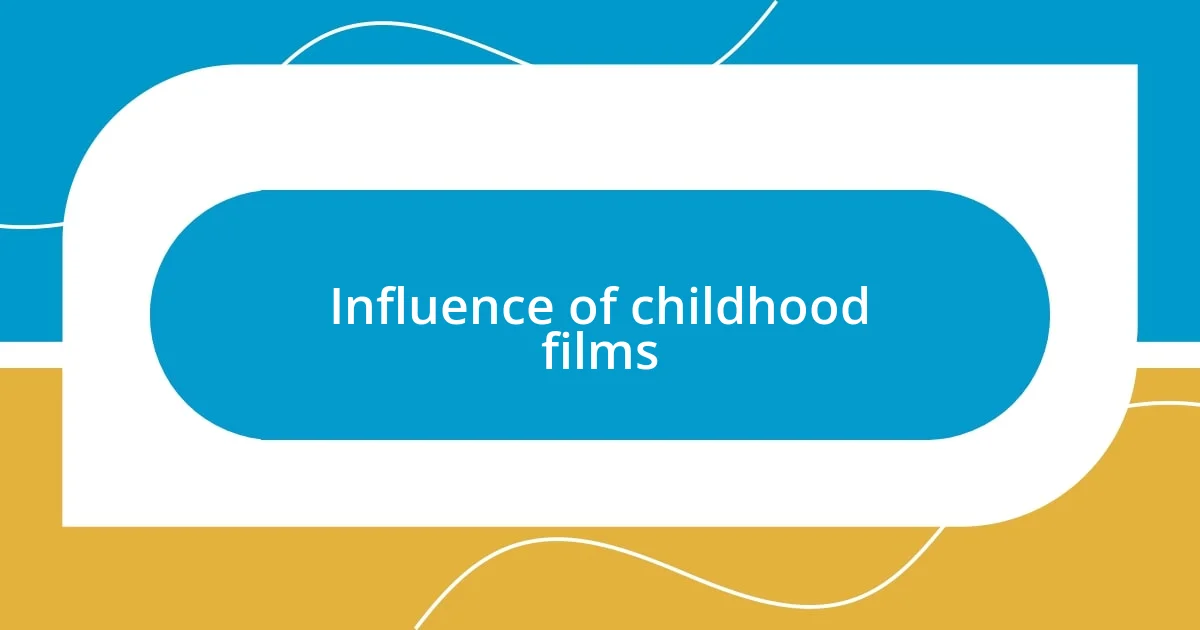
Influence of childhood films
Growing up, my weekends were often filled with animated adventures. I can still vividly recall the thrill of watching “The Lion King” for the first time—it was like experiencing a new world. Those colorful characters and mesmerizing songs didn’t just entertain me; they shaped my understanding of storytelling and character development.
As I think back on those childhood movies, I realize how much they taught me about friendship and bravery. The lessons embedded in films like “Toy Story” resonated deeply; they illustrated the power of loyalty and the importance of being true to oneself. I often find myself revisiting these films, not only for nostalgia but also to remind myself of the values they instilled in me at such a young age.
Interestingly, the feelings these childhood films evoke linger with me even today. I remember hosting movie nights with friends, choosing to introduce them to my favorites, and seeing their reactions brought back those joyful memories. It’s fascinating how films from our early years can create a lasting bond, not just with the stories themselves, but with the people we share them with.
| Childhood Film | Influence on Taste |
|---|---|
| The Lion King | Introduced themes of adventure and leadership |
| Toy Story | Highlighted the importance of friendship and loyalty |
| Aladdin | Fostered a love for vibrant storytelling and cultural exploration |
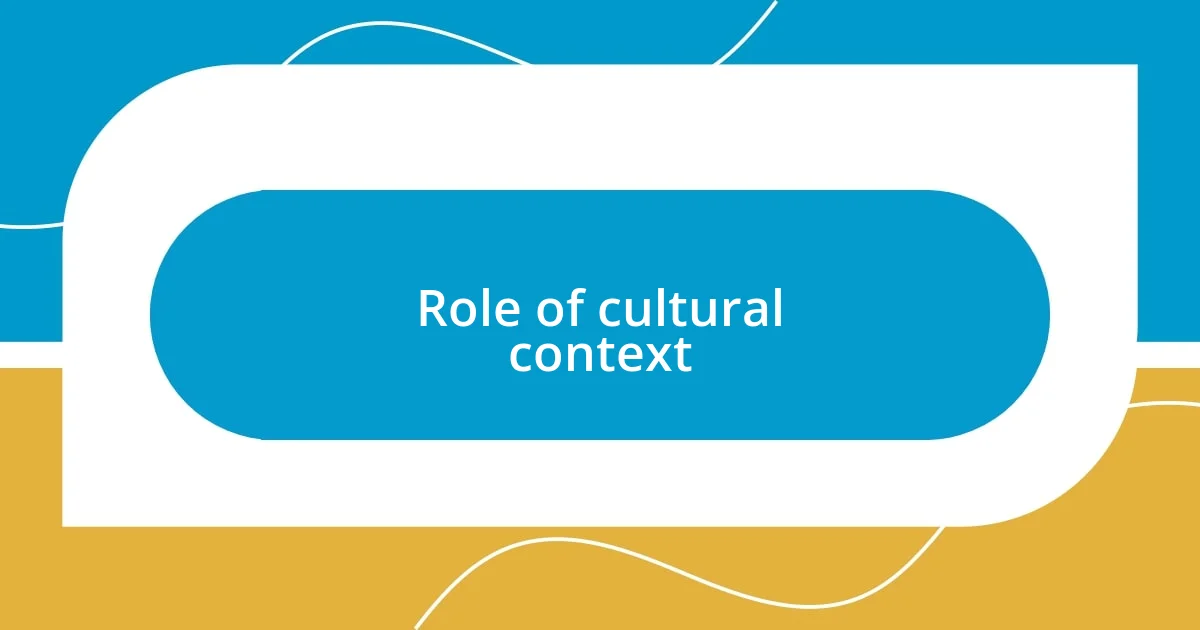
Role of cultural context
Cultural context plays a pivotal role in shaping our cinematic tastes. For me, the movies I gravitate towards often reflect the societal themes and narratives that resonate within my community. When I watched “Black Panther,” it was more than just a superhero film; it was a celebration of African culture that made me feel proud and connected. This cultural representation ignited my interest in films that highlight diverse narratives, enriching the way I view storytelling.
- My family’s traditions influence my taste; films about family and community resonate deeply with me.
- Exposure to international films has broadened my perspective, making me appreciate subtle cultural nuances.
- Witnessing social issues portrayed in films can inspire me to explore related topics further, creating a desire for deeper understanding.
Each film carries the weight of its cultural background, contributing layers of meaning that can change our personal preferences. Reflecting on films such as “Parasite,” I found myself captivated by how class disparity was depicted, leading me to seek out more narratives that explore societal structures. Engaging with these films opened a dialogue not just with the storytelling but also within myself, prompting reflections on my values and the world around me.
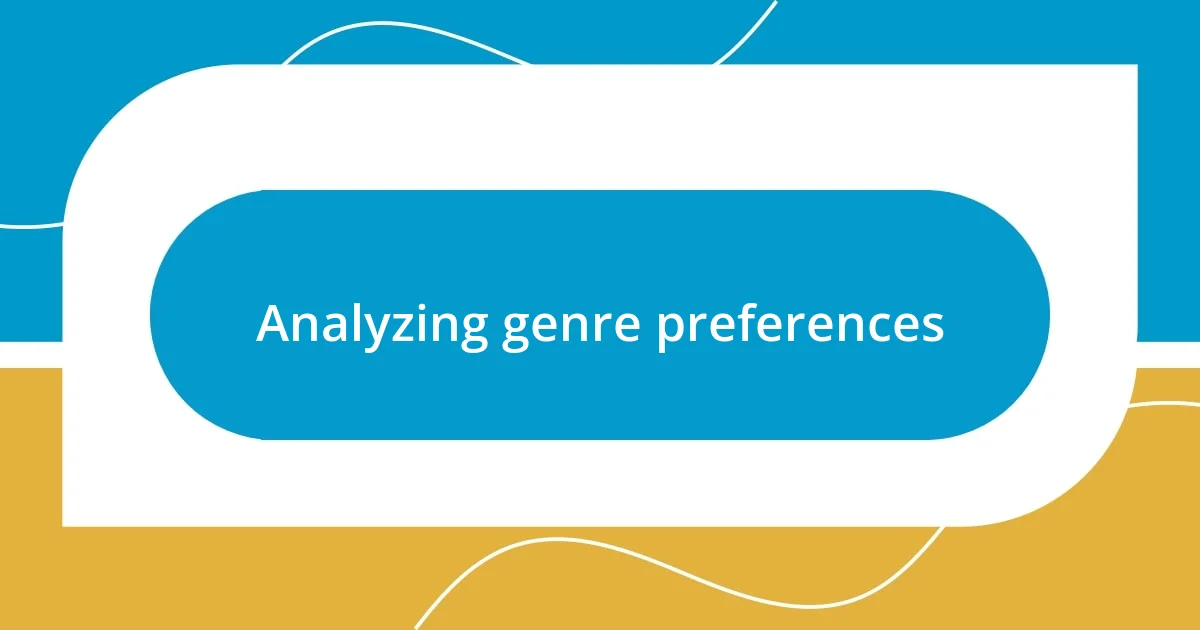
Analyzing genre preferences
I’ve often found that my genre preferences reflect not just what I enjoy, but how I feel connected to certain stories. For instance, I lean heavily toward dramas that explore human emotions and relationships. One film that I can’t shake off is “The Pursuit of Happyness.” The raw portrayal of struggle and resilience struck a chord in me, compelling me to seek out similar narratives that reveal the complexities of life and the triumph of the human spirit. How does it feel when a film connects so deeply with your own experiences?
Comedy is another genre I gravitate toward, especially when I want to escape from reality. I remember watching “The Grand Budapest Hotel” and being enchanted by its quirky storytelling and vivid visuals. The film’s blend of humor and poignancy offered a refreshing perspective on friendship and loyalty. It’s interesting how a well-placed joke can transform a heavy moment into something light-hearted, making me appreciate clever writing that balances seriousness with laughter. Don’t you find that the films which make us laugh often resonate with our need for joy amid life’s challenges?
When analyzing my preferences, I can’t ignore the impact of thrillers as a genre. I recall binge-watching “Gone Girl” on a rainy afternoon—my heart raced with every twist and turn. The suspense kept me on the edge of my seat, and I realized how much I enjoy films that engage my mind and emotions, inviting me to unravel complexities. This genre has led me to explore psychological themes like trust and betrayal, pushing me to think more critically about human interactions. What about you? Are there films that pull you into a whirlwind of emotions, leaving you both exhilarated and contemplative?
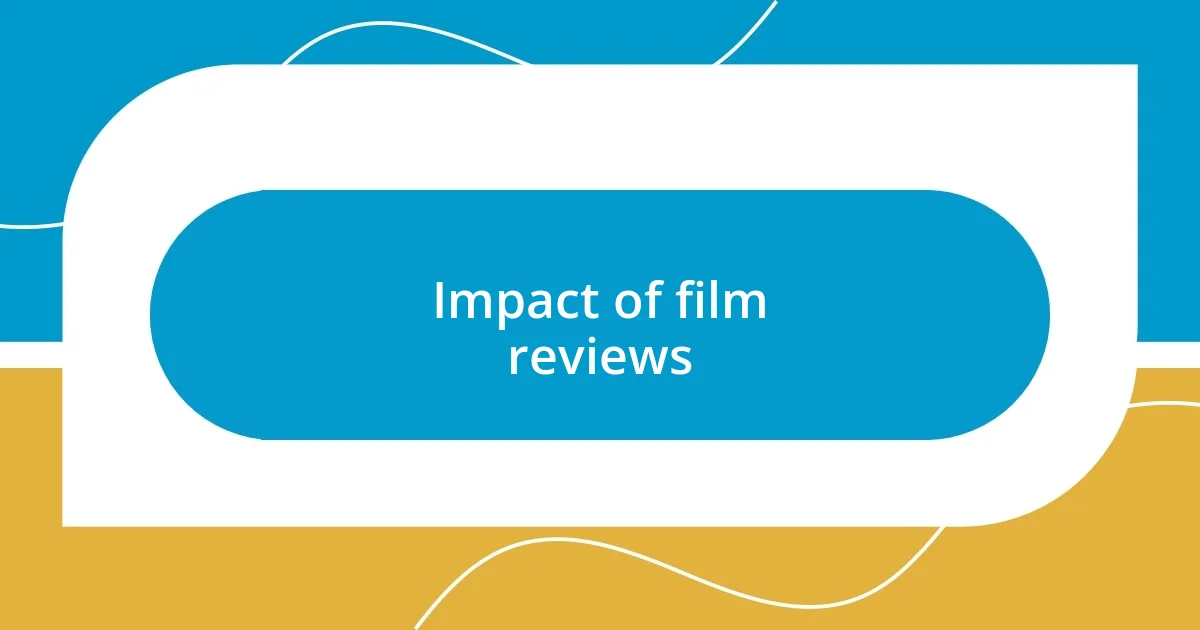
Impact of film reviews
The impact of film reviews is profound, as they can significantly shape my viewing choices. I’ve often found myself swayed by the opinions of critics; a single glowing review can ignite my curiosity about a lesser-known film. For instance, after reading a passionate critique of “Moonlight,” I felt compelled to dive into its intricacies and explore themes that resonated with my own experiences of identity and self-discovery.
Sometimes, I discover films I would typically overlook thanks to insightful reviews. Recently, a friend shared a review of an indie drama that she thought would resonate with my fascination for character-driven narratives. Trusting her judgment, I gave it a shot, and I was surprised at how deeply it connected with my feelings about family dynamics. Isn’t it amazing how a well-crafted review can act as a guiding light, illuminating hidden gems we might otherwise miss?
Additionally, reviews often provide context that enriches my understanding of a film. I vividly remember watching “Knives Out” and being captivated by its clever plot twists. Later, I read a review that highlighted the film’s commentary on class and privilege, and that gave me a new lens through which to appreciate the story. It made me reflect on how films can serve as not just entertainment, but also as platforms for deeper societal discussions. Do you find that film reviews enhance your cinematic experiences in a similar way?
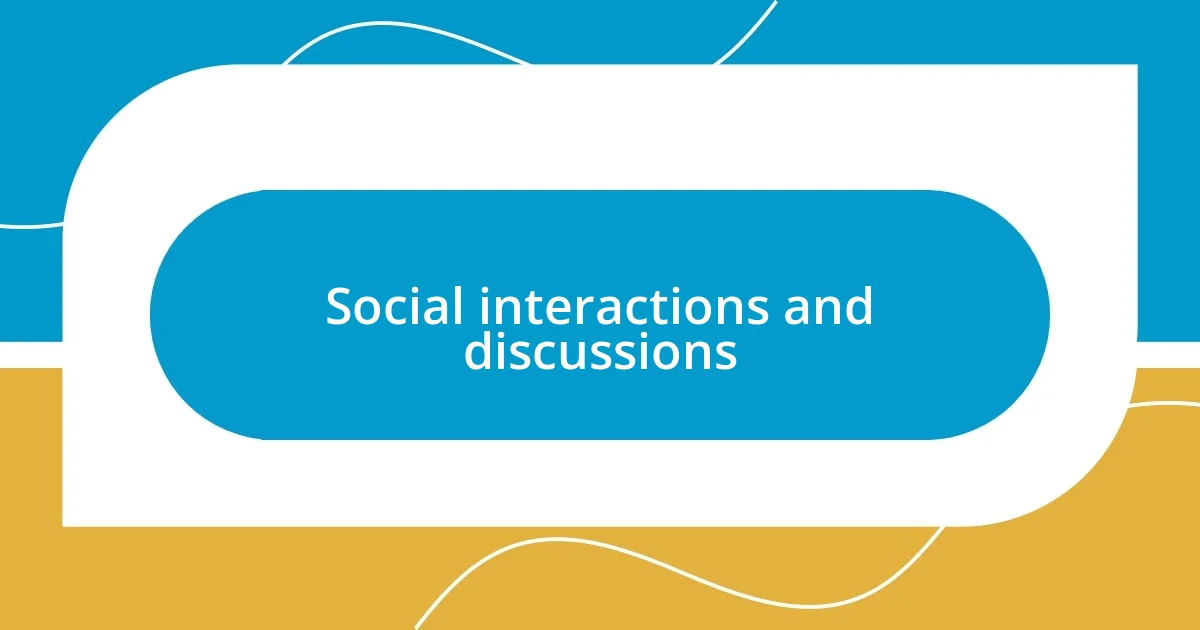
Social interactions and discussions
Social interactions around cinema can be a delightful blend of shared opinions and passionate debates. I remember one evening spent with friends, where we gathered to watch “La La Land.” After the credits rolled, the conversation sparked into a lively discussion about the artistic choices and underlying messages of the film. It was fascinating to hear different perspectives, each revealing how personal experiences shape our interpretations. Have you ever found your views challenged in a good way during a film discussion?
Discussing films often serves as a bridge to deeper connections with others. A casual chat about a horror flick like “Hereditary” evolved into a profound conversation about grief and family dynamics. In that moment, I realized how cinema can create safe spaces for exploring complex emotions and experiences. It struck me that this shared dialogue makes us not just spectators, but active participants in a larger narrative. I wonder, how do you feel when you connect with others through film discussions?
Moreover, these exchanges can sometimes lead to unexpected recommendations that broaden my taste. A friend’s enthusiasm while discussing “Parasite” encouraged me to delve into international cinema, ultimately reshaping my viewing habits. I found myself more open to diverse stories, understanding that every film offers a new lens through which to view the world. Isn’t it remarkable how a simple film discussion can inspire us to explore beyond our usual cinematic boundaries?
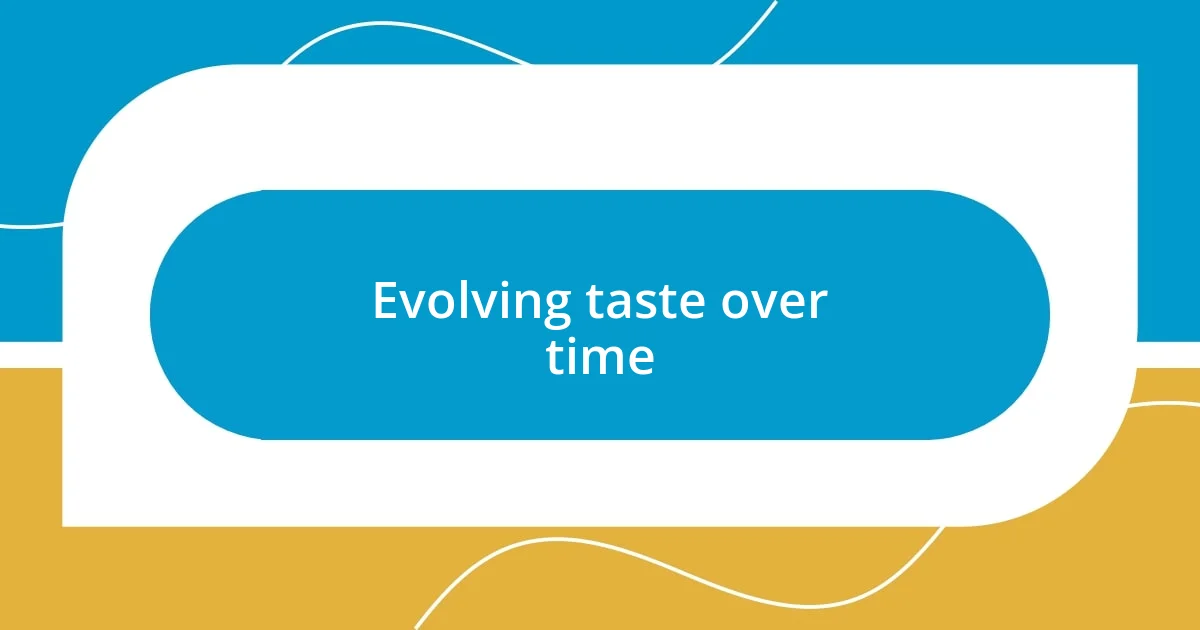
Evolving taste over time
I’ve noticed that my tastes in cinema have evolved dramatically over the years. In my teenage years, I was hooked on action-packed blockbusters and high-energy thrillers. Yet, as I matured, I found myself drawn to more nuanced stories, with emotional depth and social commentary. It’s funny how life experiences shift one’s palate—what excited me as a teenager now feels less satisfying. Have you ever revisited an old favorite and wondered why it no longer sparks the same joy?
During my college years, I was exposed to foreign films and independent cinema, which opened the door to a wider variety of narratives. I remember my first encounter with a film like “The Lives of Others.” The slow build and intricate emotional layers captivated me in a way that explosions and car chases never had. I was hooked! It was like discovering a new flavor, and I couldn’t help but crave more—films that challenge and evoke, rather than just entertain. Isn’t it amazing how a single film can alter your entire viewing trajectory?
Now, my film selections often reflect my evolving worldview and interests. I gravitate toward stories that amplify underrepresented voices or tackle challenging themes, like mental health or social justice. Watching “Promising Young Woman,” for instance, left me both shocked and provoked to think about gender dynamics in our society. Such films resonate with my current values and beliefs, making the experience far richer than simple escapism. Do you find that the films you choose to watch reflect where you are in life, shaping your understanding of yourself and the world?
